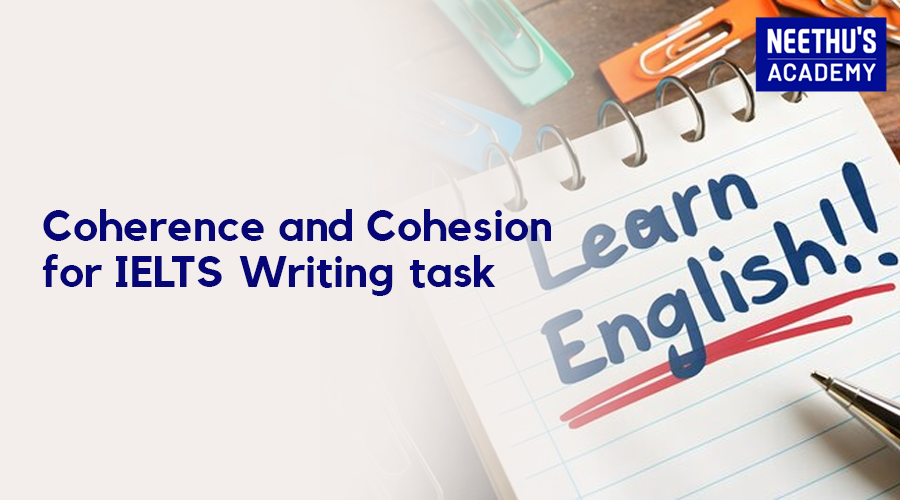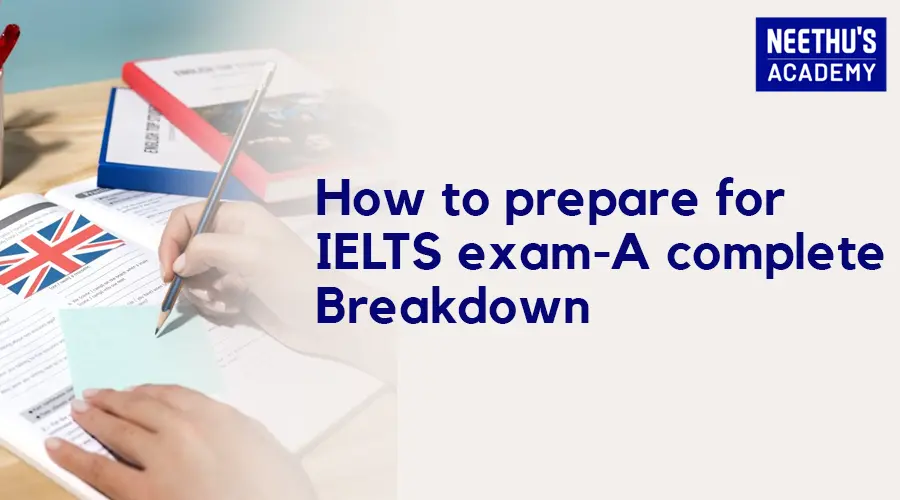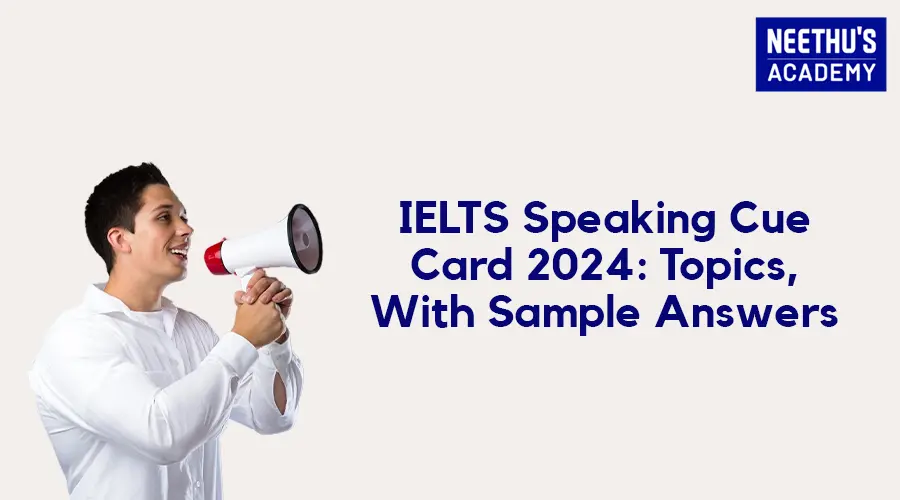Why Students are unable to score good bands in IELTS Writing?
Taking the IELTS test is a big step in your life and hence choosing the best IELTS coaching centre is equally important. But, while considering IELTS writing, the focus must be laid on those factors that will help in scoring good bands in writing tests. Neethu’s Academy focuses on the elements as a whole that help in passing IELTS with flying colours. This blog mentions the obstacles that hinder a good band of score in IELTS writing
- Complicated Sentences: It’s a fact that IELTS writing is a professional writing test assessing clear and effective communication but the issue arises when students try to complicate their writing with much more complicated sentences with the intention to impress the reader. We at Neethu’s Academy, one of the best IELTS coaching institutions in Kerala, train students to frame sentences with multiple thoughts while keeping a clear expression. Hence, learn the techniques and ways with which good sentences can be framed without confusing the readers.
- Meet the expectation: Another major reason why Indian students are unable to score good bands in IELTS Writing is the fact they do not attempt to answer what the examiner is asking for. Interpretation of questions in the right way is of utmost importance, and most students fail to understand the intention of the question and write as per their liking and then expect the examiners to accept their interpretation. This understanding only reaches the right point when you consistently practice writing with apt guidance and only the best IELTS coaching centres can help you with it.
- Grammar: Grammar carries 25% of your IELTS writing score and you cannot go wrong with the grammar if you aspire to score a high band in the IELTS writing. Grammar is the foundation of any language and as a professional language test, it’s the responsibility of the students to learn grammar because just the use of basic and advanced vocabulary will not communicate the subject. For the subject of communication, grammatical knowledge needs to be acquired. The IELTS curriculum at Neethu’s Academy includes dedicated weeks for grammar as effective communication also depends on grammatical knowledge.
- Unreliable Resource: Another major reason for the inability of Indian students is the choice of words in their writing. I have read a lot of essays where I felt that the writer was trying to create a sentence just to use a specific word such as plethora. This is not required in IELTS writing. The primary goal is to use words according to the situation and which are relevant to the question, you cannot use any word anywhere and then expect the reader to have a WOW! moment. The use of vocabulary is one of the major issues for a majority of IELTS students since they may not know the proper usage of a word, but they still use it because someone on YouTube said that it is a magical word. The IELTS trainers at Neethus Academy do not teach you vocabulary, but we focus on effective usage of words that not only get you good band scores but also make your writing clear and communicative.
- Legible Handwriting: This is only for those candidates who appear for a paper-delivered IELTS Test. The readability of handwriting is also an important factor as a reason for students being unable to score good bands in IELTS Writing. It is simple if the examiner cannot read what you’ve written, you will not be awarded the expected mark. There is no compulsion to use cursive writing, but try to develop good and readable handwriting if you wish to appear for a paper-delivered IELTS Test
Keep these factors in mind in order to have control over your IELTS writing test and joining the centres that guide you rightly on these factors will also help in scoring a high band in IELTS.
When taking the IELTS test, candidates are graded on coherence and cohesion for both Task 1 and Task 2. This makes up a significant portion of your overall score, so it is important to know what they are and the most effective ways to incorporate them into your writing. Here’s what you need to know
What is coherence?
Coherence is when the parts of something fit together naturally. In writing, it is when your ideas are connected naturally and logically. There is a beginning, middle, and end. Your ideas are easy to follow and flow together well.
What is cohesion?
Cohesion is the words and phrases connecting your sentences within your writing. Each sentence connects well grammatically to the next, from start to finish.
Now that you know what coherence and cohesion are, here are some of the best ways to create both in your writing.
Most Effective Ways to Create Coherence – Body paragraphs
When completing the writing section of the IELTS test, you should always use paragraphs. For General Task 1, you can separate your bullet points into paragraphs. For Academic Task 1, you should have an introduction and 1-2 body paragraphs. A conclusion is optional for this task.
When writing Task 2, paragraphs are very important. You should have an introductory paragraph, 1-3 body paragraphs (depending on how much you can write), and a conclusion. The number of body paragraphs is also dependent on which type of essay you are writing. For example, if the task is a discussion essay, you can write one opinion in the first paragraph of the body and the opposing opinion in the second paragraph.
The topic should be very clear in all paragraphs. Try not to write off-topic or add any ideas not related to the topic in any of the paragraphs. When the examiner is reading your essay, they should never ask themself, “Why is the candidate writing about this?”.
Topic sentences
A good way to create coherence is to have a topic sentence in each body paragraph introducing the idea within the paragraph and how it connects to the main topic. This helps with readability and reader comprehension.
Cohesive devices
Cohesive devices are all the words and phrases used in writing to connect sentences and ideas. Words such as however, moreover, and in conclusion, are used frequently by candidates when writing Task 1 or Task 2.
Taking A Closer Look At Coherence And Cohesion
Now we have a GENERAL idea of what coherence and cohesion mean, let’s look at the IELTS band descriptors to get a better understanding. These are freely available on the IELTS and British Council websites, but actually, they are quite difficult to understand, and this causes various problems. When we look at band 5 for IELTS writing task 2, we can see it talks about the essay having “some organisation” but perhaps lacking progression. It talks about “inadequate, inaccurate or overused cohesive devices,” as well as repetition and poor paragraphing.
If we skip ahead to band 7, there is now logical organisation, clear progression, mostly good use of cohesive devices, and good paragraphing. When we go above band 7, there is nothing really specific. It just talks about those same things being done in a better or more natural way, with few if any problems.
If we look at the band descriptors for task 1, which is to say a letter or report, the criteria given are basically the same, except that there is no specific mention of paragraphing. Thus, we can conclude that there are 5 important factors in getting a good band score for coherence and cohesion:
1. Organisation
2. Progression
3. Cohesive devices
4. Referencing
5. (for task 2) Paragraphing
Let’s look at each of these in turn so that we can understand how to improve our IELTS essays.
ORGANISATION
First of all, let’s look at the organisation. This means how your ideas are arranged within the essay. As I mentioned earlier, an essay that gets band 5 for coherence and cohesion will have quite limited or ineffective organisation. There may just be a very basic structure imposed upon the ideas in this essay. At band 4 and below, it will be extremely random and quite difficult to understand.
To score band 6 means having your ideas presented in a way that a reader could somewhat understand, and beyond that, they will be more neatly divided. Let’s say you are asked to “discuss both views” for a certain question. Well, organising your essay would first require putting those ideas into paragraphs. Most logically, you would have one paragraph with one perspective and another with the opposite perspective.
It is also why there is no real mention of paragraphing for task 1 even though you are expected to use paragraphs. In a letter or a report, the paragraphs are seldom structured with the same degree of complexity as a task 2 essay. Last week, I talked about “grouping data” for task 1 reports and I said that you can often split a chart table or diagram into two parts and devote one paragraph to each. Likewise, for a letter, you would give one short paragraph for each main point. These are both examples of organisation.
PROGRESSION
Progression is a tricky topic, or at least it seems that way at first. As we saw earlier, band 5 essays typically lack progression, whilst band 7 ones have “clear progression,” and even a band 6 essay will have “overall progression.” But what does this mean?
I’m sure you know the word “progress,” which is usually defined as moving forward or developing. An essay, letter, or report should feature progress by guiding the reader from a logical beginning to a logical ending. For essays, we start with an introduction. This will set the topic and tell the reader what comes next. Then there’s the middle of the essay, which will logically discuss ideas or provide an argument before this is all neatly summarised in a conclusion.
Problems with progression tend to come in the introduction, where people make mistakes like having a first sentence that fails to set up the topic in an easily understandable way, or lacks a thesis statement or opinion if one is required. Similarly, body paragraphs may fail to demonstrate progression if each sentence does not logically build upon the previous one.
COHESIVE DEVICES
The most important thing about cohesive devices, first of all, is that you use them. A good essay will not NEED many cohesive devices. It will logically guide the reader by presenting relevant information through the aforementioned organisation and progression. Instead, you should just use a few cohesive devices when they are necessary or to stress a point. Good writers often them to introduce an example or to highlight contrast.
When it comes to coherence and cohesion, many people say “Write four paragraphs and use lots of cohesive devices,” but as we have seen that is not a good enough approach. Coherence and cohesion are more complicated than that. It requires a good grasp of both language and logic.
Most importantly though, whether you are writing a practice essay or a real one, please spend some time to plan out your essay before you start writing. Most of what I have mentioned in this video could be more easily achieved by following a simple plan. Whilst this may seem like a waste of time to some people, it will help you do at least 3 of those 5 important things we discussed:
1. Organise your ideas
2. Show progression throughout
3. Paragraph logically
Once you can do that, the cohesive devices will be easier to apply and then you just have to work on your referencing skills. With all that down, you’ll be on track for a great IELTS writing score and most importantly, Neethus’s Academy can be your perfect guide.





